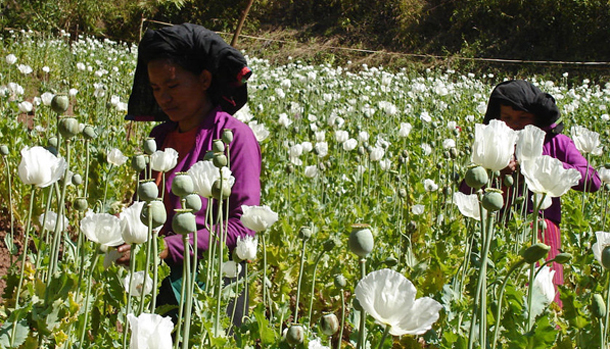RANGOON — Opium and methamphetamine production continues to rise in Burma, and increasing amounts of the illicit drugs are being smuggled to East and Southeast Asia, a report by the UN Office on Drugs and Crime (UNODC) warned on Friday.
The UNDOC said seizures of opium, heroin and methamphetamine pills, as well as crystalline methamphetamine and precursor chemicals, “increased significantly in 2012” in Burma. The restive and rugged region of Shan State, perched between the borders with Thailand, Laos and China, continues to be a main source of illicit drug production, the agency said.
Last year, the number of seized methamphetamine pills saw a more than three-fold annual increase to about 18 million pills, the biggest haul since 2009, the UNODC said. Authorities also discovered 426 kilograms of crystalline meth, a more than ten-fold increase compared with 2011 and the largest crystal meth find since 2001.
Much of the seized methamphetamine was found during a raid on a storage facility in Tachileik, a Shan town located on the Thai border, where police found about 8.7 million meth pills. A bust of a clandestine laboratory in Shan State’s Kokang Special Region in July uncovered 73 kilograms of crystal meth as well as 274 kilograms of liquid meth and intermediate forms of methamphetamine, according to the UNODC.
Last year, opium cultivation and production “reached their highest level since 2003,” the agency said. The area under poppy cultivation increased by 17 percent compared with 2011, to reach about 51,000 hectares, while potential opium production increased 13 percent year-on-year to about 690 tons, worth some US $359 million, according to the agency.
It was the sixth consecutive year that opium production rose in Burma, which now produces about 10 percent of the world’s opium, making it the second-biggest producer after Afghanistan, according to UNODC. Production levels, nevertheless, remain far below those of the mid-1990s.
Most of the illicit drugs produced in Burma are destined for Thailand and China, and to a lesser extent Vietnam and Bangladesh, the UNODC report said, adding that 90 percent of all meth pills seized in China and Thailand were produced in Burma.
The agency said that across East and Southeast Asia “seizures of methamphetamine in pill and crystalline forms reached record highs while methamphetamine use increased in most countries,” adding that a total of 227 million meth pills were seized in the regions in 2012.
In Burma, there are between 300,000 and 400,000 drug users, according to estimates of the Myanmar Central Committee for Drug Abuse Control. The vast majority of those drug users opt for heroin and opium. The UNODC warned, however, that domestic meth use “is rapidly increasing.” The agency said arrests are also on the rise and that last year a total of 5,740 Burmese were apprehended on drug charges.
In Shan and Karenni states, opium poppy growing is an important source of income for impoverished farmers, and some 300,000 families in Burma rely on the cash crop, according to UNODC estimates.
Many farmers have been caught up in a decades-old conflict between the government and ethnic rebel groups, which are demanding greater political autonomy and control over natural resources. Despite the signing of several ceasefires last year, tensions remain high in parts of Shan State.
Wa and Kokang ethnic rebels, Palaung rebels, the Shan State Army-North, the Shan State Army-South and other armed groups have been battling the Burma Army and an array of government-backed militias. Groups on both sides of the conflict are believed to be involved in the drug trade.
The UNODC said small-scale meth production was occurring “primarily in territories controlled by active or former ethnic insurgent groups.” The report added that there was “almost certainly an industrial-scale production of methamphetamine pills and crystalline methamphetamine” taking place in Shan State, but it stopped short of naming the groups that could be involved.
Burma’s government has increased its cooperation with the UNODC in the field of drug eradication since President Thein Sein’s reformist government assumed office in 2011.
Some ethnic rebels groups say they are implementing their own drug eradication programs, and the Restoration Council of Shan State (the political wing of the Shan State Army-South) has been in talks with Naypyidaw and the UNODC about cooperating on eradication programs.
In August the RCSS said, however, that these efforts had faltered due to “a lack of collaboration from government troops in the region.” It said that successful drug eradication was directly tied to a political solution for the ethnic conflict.
Shan National League for Democracy leader Khun Htun Oo said the long-running conflict was the root cause of his state’s drug problems, and he claimed that the government-backed “people’s militias” were the main culprits in the surging drug production.
“They have about 200 people’s militias. To maintain these forces they have to rely on drugs; drug trading, opium growing, manufacturing Yama [meth] and all. That’s one of the reasons,” he said.
“They are given the task to monitor the movement of the armed [rebel] groups… That’s why they are given the right to produce and trade opium,” the Shan politician said. “The bigger groups will produce methamphetamine. The groups of more than 300 [militia men] will produce that because they can safeguard and control areas.”
Asked if ethnic Shan rebel groups were involved in the drug trade, Khun Htun Oo said, “Maybe not all, but some are involved—the bigger groups.” The rebels were involved, he said, in order to sustain their armed struggle, adding, “If you don’t grow opium, how can you bring anti-aircraft guns, bazookas and RPGs, and the latest weapons?”
The SNLD leader said he had little hope that UNODC and government drug eradication plans would stem the drug trade in Shan State any time soon.
“The situation is chaotic, now everybody seems to be corrupted, even the officials are corrupted,” he said, adding that several of the alleged drug lords running the militias were even members of Burma’s Parliament.
















